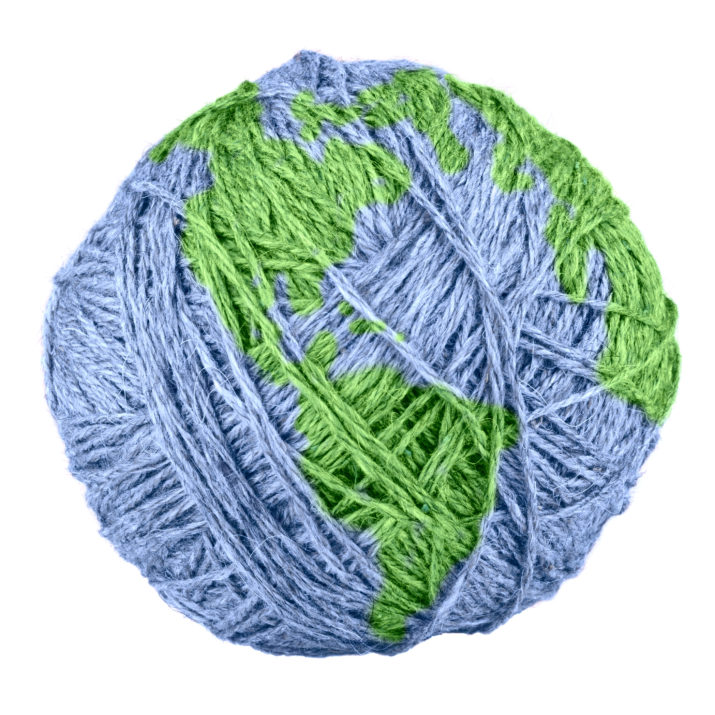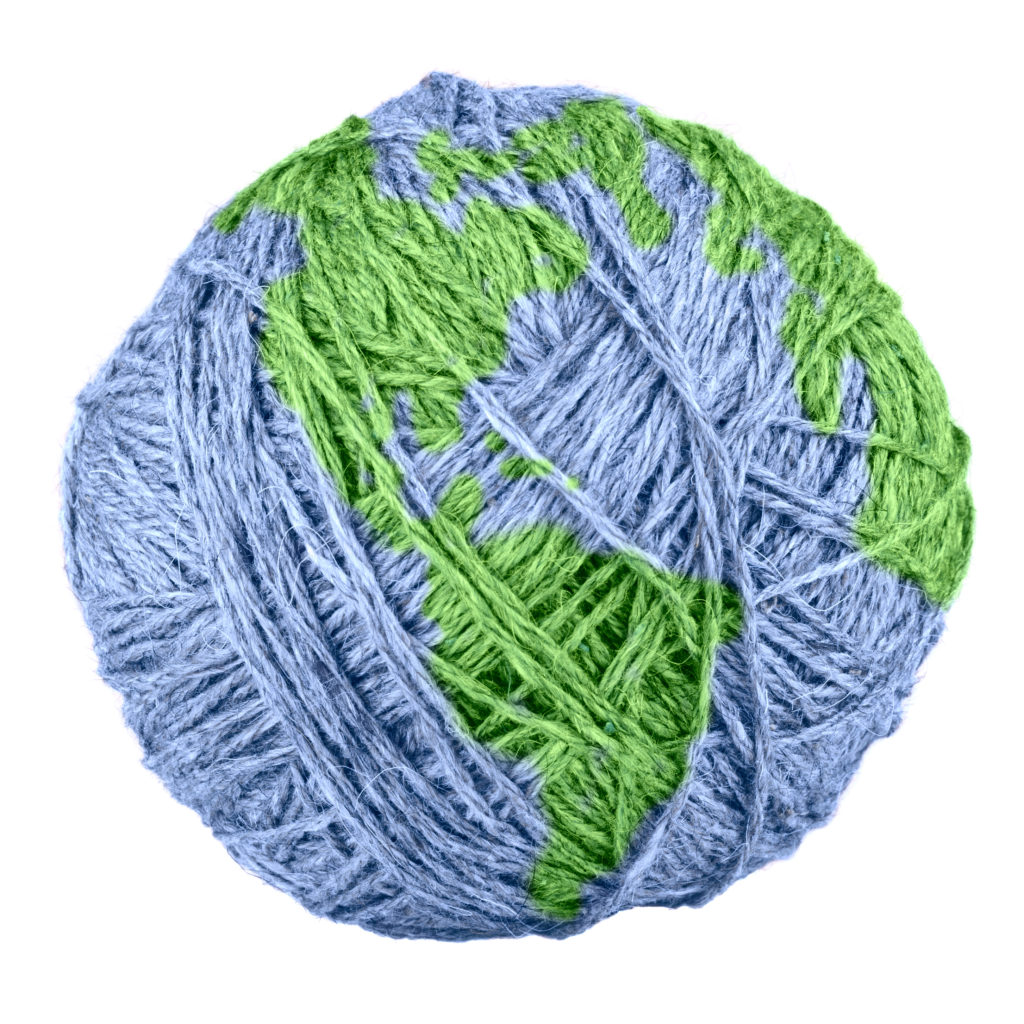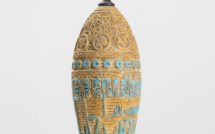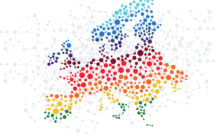

This is part of our Campus Spotlight on Bard College Berlin.
We ran the first blended learning class, called Writers/Artists/¡Activistas!, at Bard College Berlin in the spring of 2018. The class was held synchronously in a classroom and online, using Google Hangouts, allowing students in other countries enrolled through Kiron Higher Education to take part. Online students were beamed into the classroom, via a large TV screen and a webcam. About 80 percent of the students, in the classroom and online, were refugees, mostly from Syria or neighboring Arabic countries, who had arrived in Germany during the 2015 crisis. Many of the Bard students were also participants in our Program for International and Social Change (PIESC), a scholarship program for students from areas of crisis. As part of the class, we created an event called Workshops for Humans that allowed the Bard students to meet the Kiron students in person and experience, hands-on, some of the work we had explored as a class. One workshop focused on Jayna Zweiman’s Pussyhat and Welcome Blanket Project, and while teaching the students how to knit, I had the pleasure of discussing the meaning of the word pussy and how the project took the word and empowered it. As the discussion grew, the students and I examined other labels. Just as the word pussy gave us a way to look at #metoo, the N-word became a way to discuss the #blacklivesmatter movement. We had opened a space in the discussion to look at the pronouns they/their and per. A student struggling with the knitting, suddenly put it down and asked about the word refugee and commented on how that had become politicized in their circles. The question allowed us to explore a whole new set of ideas surrounding identity, migration, and intersectionality in a way that would not have been possible without the workshop setting and the trust we had built through our online community.
As an undergrad at UC Berkeley, Trinh T. Minh-ha’s class, Feminism and Film, influenced the class I was now teaching, when in a lecture she explained how the dominator culture could be subverted by small actions and then went on to describe how she hand cranked her film at 25-frames-per-second, whereas film is usually cranked at 24-frames-per-second. She asked us, a class of mostly women (some of us early 90’s activist womyn) why would something imperceptible to the human eye, make a difference? When she went onto explain that just this simple act could subvert the status quo, the dominator culture, my life changed completely. I began to understand that one could protest effectively through art and writing, and that how art is created can be just as important as the subject matter.
I had been unwittingly collecting material for this class for decades. Writers Rebecca Solnit, bell hooks and Arundhati Roy provided the theoretical underpinnings of the class. The work by artists such as Catherine Opie (Dyke Deck and Self Portraits), Kara Walker (A Subtlety), Felix González-Torres (Death by Gun), and more complicated pieces like Shepard Fairy’s protest posters and even the somewhat problematic “social sculptures” of Joseph Beuys—all became text to explore. The most accessible piece we discussed was the three upended buses installed in front of the Brandenburg Gate in Berlin, by Syrian-German artist Manaf Halbouni. In Aleppo the buses had been used to block sniper bullets from entering a neighborhood. At the Brandenburg Gate they served to remind us (among other things) of the divisive nature of walls erected during wartime and the unity that can come when they are dismantled. Students, especially those who are new to English, find it sometimes difficult to write about texts that are not written texts, even though much of our modern culture happens in visual images. The most important pedagogical component of the class then, was that it provided students with a means to explore ways of writing about non-written texts in an academic setting. As I collected material for the class, movements were springing up all over the internet. Early in our class, the Parkland shootings happened in Florida and Emma González became an activist overnight. While we watched her eloquent speech online, one of the Syrian students remarked wryly, “We too have issues with weapon proliferation.”
In the class, we worked to create a safe classroom, where students could explore ideas openly. I had been born too late to participate in the women’s circles of the early 1970s feminists—alas I had only read about them or been told about them from older activists—but the event, Workshops for Humans, allowed a kind of circle to happen, an exchange of knowledge and ideas through the act of knitting. As the students learned to knit and purl, we discussed the welcome blankets and toques groups of people made for incoming refugees. A student shared that in the early days of the revolution in Syria, people would knit the opposition flag or friendship bracelets in green, white and black stripes, the white stripe adorned with three tiny, red knitted stars. When another student asked where knitting was invented, I replied that the oldest known piece of knitting is from Egypt and the skill seems to have come into Europe through migration and trade routes. Even the Fair Isle knits of England, legend has it, were developed after Spanish sailors, who had learned the craft from Arabic migrants to Spain, had brought knitting to the island.
“So knitting is another Arabic migration to Europe?” someone asked. As the discussion turned again to trade routes and then the long list of commodities like sugar, coffee, tea, and chocolate that had come to Europe from someplace else, questions begat more questions. Who held the power? How were the commodities obtained? If they were traded, was it by force? Who practiced knitting—men or women? As the discussion ensued and the workshop came to a close, the students had decided that knitting, unlike coffee, tea, sugar and chocolate, was not so much a commodity but a skill and we realized that if knitting had traveled, it had to be taught, meaning the proliferation of knitting implies that people sat down together and exchanged the skill, as well as language, as well as time and material.
In her essay “Democratic Education,” writer bell hooks quotes from T.H. White’s The Once and Future King who writes: “education at its best—this profound human transaction called teaching and learning—is not just about getting information or getting a job. Education is about transcendence, about renewing the vitality of life. It is about finding and claiming ourselves and our place in the world.” In the transaction of our class—the skinny as it were—I teach students how to write academically about complicated texts. But what I also teach, or better said, what I hope transpires, is that the students learn through the texts we explore, to “find and claim their place in this world” and ultimately discover how to crank the film at 25-frames-per-second.
SYLLABUS
Course Description
The filmmaker and writer Trinh T. Minh-ha, once described how when she filmed her movie, Living is Round, she used a hand held camera and hand cranked the film at twenty-five frames per second. While the difference between twenty-five frames per second and the industry standard of twenty-four frames per second is imperceptible to the viewer, Trinh T. Minh-ha revealed that hand cranking her film at a different speed was her way of subverting the dominant paradigm. In an era of Pussy Hats and memes and mass protests can such a small, deliberate action really make a difference?
This course will explore small acts of consciousness and the nexus where the writer and/or artist might achieve this by the dint of their work alone. What happens when conscientious acts move from being merely a political practice to becoming something that resembles works that are more subtle and personal? What happens when an artist’s work veers into the political realm?
Looking at conscientious action, both large and small, we will look for a way to define an Activista! and try to determine the ways some writers and artists are shifting the dominator paradigm. Through the lens of Trinh T. Minh Ha and others who use their art to question existing social structures, we will survey the work of Rebecca Solnit, James Baldwin, Arundathi Roy, bell hooks, Judith Butler, Rajeev Balasubramanyam, Agnes Varda, Lucy Walker, Cathie Opie, Kara Walker, Shepard Fairey, Xandor Katz and Jayna Zweiman among others as a way to engage and share thoughts on bigger questions about social responsibility, economic justice and cultural engagement.
Building on proven pedagogical methods developed by the Bard College Institute for Writing and Thinking, this “Writing to Learn” class will offer students the chance to grapple with the above questions through close reading, focused and private writing, group projects and seminar discussions. The main aim of the course is to improve students’ ability to draft successful narrative, descriptive and analytical essays in academic English, as well as to develop skills in verbal argumentation, critical thinking and effective collaborative work needed for success in almost any discipline in the university setting. This class is a blended learning class at Bard College Berlin, made possible through support from the Open Society Foundation, done collaboratively with Kiron Open Higher Education and The Carey Institute for Greater Good. This means the class will take place on the Bard College Berlin campus and online simultaneously, bringing together students based in Berlin with students located across the world studying with Kiron Open Higher Education. Through this process, students will engage in global learning and cross-cultural negotiation, as well as sharpen their digital literacy skills.P
Blended Learning Course
This course is a blended learning project supported by the Open Society Foundation and brings together as partners Bard College Institute for Writing and Thinking, Bard College Berlin, Al-Quds Bard College for Arts and Sciences, Kiron Open Higher Education, and The Carey Institute for Greater Good. The class will bring together on-site students from Bard College Berlin and online students studying with Kiron Open Higher Education. The class will be synchronous—meaning it is held online and on-site simultaneously—as well as provide an asynchronous web-classroom that students can access anytime they like. Students will have the opportunity to work with colleagues studying in various places as well as have an online classroom to engage and exchange ideas. Students taking the class as ‘online only students’ will be broadcast into the on-site classroom and will view the campus onsite classroom through their screens. All students are expected to bring laptops or phones with a usable camera to class.
Required Texts
Hope in the Dark Rebecca Solnit (to be purchased by student)
Teaching Community by bell hooks (to be purchased by student)
Public Power in the Age of Empire by Arundathi Roy (to be purchased by student)
Transit Tales workbook (available as a .pdf on the class website)
Links to essays by Nayeri, Balasubramanyam, Lorde and others will be available online
Assignments
In-Class Writing
We open every class with a brief, in-class writing assignment to get our minds attuned with writing.
Reading Questions
We will respond to all assigned reading in the form of observation, questions and comments that will be posted to the website weekly.
Online Posts
The online posts take various forms and can be either response posts to various questions or perhaps a small creative project.
Peer Review Letters
The peer review letter is a letter written to your fellow student assessing a rough draft. The letter discusses what works and what doesn’t work in your peer’s writing or project. A Peer Review letter is due with every assignment.
Assignment One: Your Silence Will Not Protect You—Narrative Essay
“Your Silence Will Not Protect You” was at one time a pin the group ACT UP passed out as a response to the AIDS crisis and a Barbara Krueger piece. In our first paper—a narrative essay—we will use Lorde’s essay, “Transforming Silence into Language and Action” as a way to examine a moment where we might have experienced such a transformation. Looking also to Trinh Minh-ha, we will keep focused on the idea that even so-called ‘small’ intentions can be transformative
Assignment Two: Podcast
You will have the opportunity to make a podcast based on ideas we will generate in response to the texts we’ve been examining in class and online. Some examples could include: What it means to save/be saved? [Solnit] or Living Spaces vs. Dominator Culture [Trinh and Butler] or even representations of family [Opie].
Assignment Three: From Description to Analysis
In this paper, we will try to glean some ideas from one of the texts we have worked with and use those ideas to broaden our understanding about an artists work. We will write at least three drafts beginning with a brief description of a text before moving on to research the text. In the final drafts of the paper, we will look for way to analyze the text to discover something new.
Final Project
We will be using a version of the Transit Tales Logbook as a way to record our journey. Since much of this class will take place in an in-between space of classroom and online, we will be working with the logbook as a way to share our process within this space. Students will propose a final project that will require both some research and some deeper thinking on the texts we have studied.
Course Schedule
Week 1:
In-Class
- Class Introduction, learning the platform and methods of inquiry.
- Transit Tales
- “Transforming Silence into Language and Action” Audre Lorde
Online
- Self-Portraits and Interviews
Week 2:
In-Class
- What do we think of as Text?
- Gaza Bowen—Shoes
- Jayna Zweiman projects
- “Changing the Imagination of Change” Rebecca Solnit
- “Democratic Education” bell hooks
- How to make a ”Zine” from one sheet of paper
Online
- Unexpected Activist
Week 3:
In-Class
- Hope in the Dark Rebecca Solnit
- “Living is Round” Trinh T. Minh-ha
- Narrative 1st draft due Tuesday 12.2.2019 midnight
Online
- Filming and using the camera to turn silence into language, motion, light and action
Week 4:
In-Class
- Hope in the Dark Rebecca Solnit
- “The Ungrateful Refugee—we have no debt to repay” Dina Nayeri
- Narrative 2nd draft due Tuesday 19.2.2019 midnight
Online
- Pussy Hats
Week 5:
In-Class
- Hope in the Dark Rebecca Solnit
- Joseph Beuys—“I Like America and America Likes Me” and “Sweeping Up” (Film 30 min)
- Introduce Podcast
Online
- Peer Reviews
- Post one to two links to podcasts you would recommend
SPECIAL EVENT:
ON CAMPUS
- An on campus event open to the school and the community giving us a chance to invite the on-line students to campus and meet in person.
- Film screening Wasteland by Lucy Walker
Week 6:
In-Class
- Public Power in the Age of Empire Arundathi Roy
- Cathie Opie
- Judith Butler “Performative Acts and Gender Constitution”
- Narrative final draft due Tuesday 5.4.2019 midnight
Online
- Unexpected Activist pt. 2
Week 7: (last week to withdraw)
In-Class
- Public Power in the Age of Empire Arundathi Roy
- Felix Gonzalez-Torres
- (Untitled) Death by Gun
- “Piss Christ” and “Klu Klux Klan” by Andre Serrano
- Introduce Analytical Paper
- Podcast proposal due Tuesday 12.3.2019 midnight
Online
- Podcast posts
- Podcast Q&A
- Podcast Peer Review
Week 8: (mid-term)
In-Class
- Public Power in the Age of Empire Arundathi Roy
- Shepard Fairey, Barbara Krueger
- Final Pod Cast due IN CLASS/Pod Cast listening party
Online
- Reflection response to podcast assignment
Week 9:
In-Class
- Teaching Community bell hooks
- James Baldwin
- Rajeev Balasubramanyam
- Xandor Katz
- Robert Finely
- Analytical Paper (description) first draft
- Due Tuesday 25.3.2019 midnight
Online
- Yoko Ono MAP assignment
Week 10:
In-Class
- Teaching Community bell hooks
- Jungle Eye Collective
- The Gleaners and I screening Agnès Varda
- Introduce Creative Project
Online
- Use a quote from an author to explain another text
In-Class
- Teaching Community bell hooks
- Vik Munoz “Sugar Children”
- Kara Walker “A Subtlety” and “Sugar Babies”
- Analytical Paper (sources) second draft due
Online
- Write an abstract of the paper
- Peer Review
SPRING BREAK
Week 12:
In-Class
- Teaching Community bell hooks
- Kara Walker “A Subtlety” and “Sugar Babies”
- Analytical Paper final draft due
Online
- Post three Creative Project Proposals
Week 13:
In-Class
- Review
- Creative Project Paper first draft
- Due Tuesday 7.5.2019 midnight
- Online Project MOOD BOARD
- Creative Project Peer Review
Week 14:
In-Class
- Final Presentations
Online
- Reflective response to Creative Project
- Post venues where Creative Projects could be published/displayed
Week 15:
In-Class and/or Online
- Final Creative Project and Paper due
- (Please note, if you are a graduating senior, your project and paper will be due earlier)
This project is supported by a grant from The Foundation to Promote Open Society.
Ariane Simard is a German and American writer and a writing teacher who lives and works in Berlin, Germany. She holds an M.F.A. from the University of California, Irvine in Creative Writing. Thanks to Echo Parenting and Education in Los Angeles, her teaching style is trauma informed.
Published on April 5, 2019
Photo: Close-up of yarn Earth isolated on white background | Shutterstock




